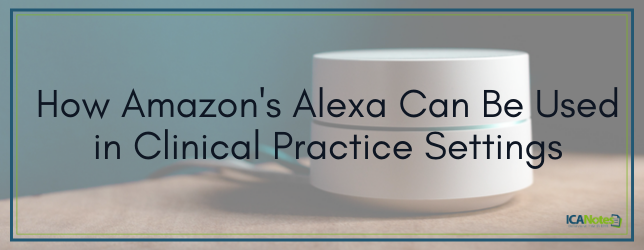How Amazon’s Alexa Can Be Used in Clinical Practice Settings
In the age of voice-command technology, it’s simple to set reminders, create alarms and record important information. Millions of users speak to smart devices for leisure and entertainment purposes, but what if advancements in voice control could help guide professionals in the healthcare industry? Believe it or not, Amazon’s Alexa is already proving itself worthy as a virtual assistant to health clinicians around the world.
The power of Amazon’s Alexa and other voice-command technology is expanding every year, but the future could be even more promising for mental and behavioral health. ICANotes is here to show healthcare professionals just how Alexa can improve the lives of themselves and their patients.
What Is Amazon Alexa?
Amazon’s assistive technology, Alexa, is a voice-operated system that completes tasks for a user. The smart speaker has the ability to automatically play music, perform internet searches, generate lists, schedule reminders and more, completely hands-free. By calling the speaker’s name, users can wake the device and instantly record or receive information.
How Alexa Is Used in Clinical Practice
Communication systems such as automated phone calls have been a major part of the healthcare industry for years, but Alexa’s smart capabilities take initiative to an all-new level. In April of 2019, Amazon’s smart speaker became HIPAA-compliant to work with sensitive health information from users.
The future of Alexa is looking bright for the mental and behavioral health industries, as the technology may be able to connect individuals to professionals and track individual improvements. Some of the current Alexa healthcare skills include the following:
- Express Scripts: Reviews the status of home delivery prescriptions and alerts when orders ship.
- Cigna Health Today: Manages health improvement goals and incentives for users.
- Swedish Health Connect: Schedules a same-day appointment visit with urgent care centers.
Most Alexa voice applications surrounding the healthcare industry cater to patients, but advancements could easily streamline documentation processes for clinicians. As more developers team with Amazon, healthcare professionals could expect large changes in the structure of appointments with clients.
The Future of Alexa for Mental and Behavioral Health Practices
The future of voice-control technology should be exciting for healthcare clinicians considering what Alexa can already accomplish. Although these features are not yet a part of the smart speaker’s set of “skills,” perhaps professionals can look forward to the following from Alexa in years to come:
- Calendar requests: The future of Alexa might bring appointment scheduling for healthcare professionals. This feature would free clinicians from the burdens of data entry. More time could be spend with patients as the speaker schedules appointments with online applications.
- Information access: Clinicians could simply access information to health records, past notes and more from the workplace. Doing so would save time between patients throughout the day.
- Call functions: Alexa might be able to connect users to therapists, counselors and more for remote visits. Such a feature could expand your list of clients by having voice technology recruit new patients by targeting keywords.
Contact ICANotes for EHR Solutions
ICANotes wants to make your behavioral health documentation quick, comprehensive and accurate. We work with all clinical disciplines in both outpatient and inpatient settings to deliver the most intuitive charting solutions. Contact ICANotes for more information about our EHR software, and be sure to request a free trial today.
Related Posts
How Artificial Intelligence (AI) Impacts Healthcare Technology
How Mobile Devices Impact Patient Satisfaction
How Smartphones Are Changing the Game for Electronic Medical Records

